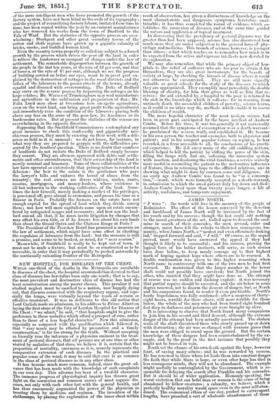NEW HOSPITAL FOR DISEASES OF THE CHEST. WHILE one-third of
the deaths in the Metropolis are ascribable to diseases of the chest, the hospital accommodation devoted to that class of diseases has heretofore been only one-tenth ; that is to say, the most prevalent and destructive class of disease has had the least counteraction among the poorer classes. This peculiar if not studied neglect must be ascribed to a notion, now happily dying out, that diseases connected with the respiratory organs, and espe- cially the lungs, were virtually beyond the reach of certain or effective treatment. It was in deference to this old notion that Lord Carlisle made an admission, in his address to Prince Albert on laying the first stone of the City of London Hospital for Diseases of the Chest : "we admit," he said, "that hospitals ought to give the preference to those maladies which afford a prospect of cure, rather than to those of a less hopeful character." Now this admission, especially as compared with the qualification which followed it, that "very much may be effected by precaution and a timely counteraction," is far too strong for the truth. Without accepting as literally true the inference of a physician eminent in the treat- ment of pectoral, diseases, that all persons are at one time or other visited by maladies of that class, we believe it is certain that the proportion of mortality, enormous as it is, scarcely represents the comparative extension of such diseases. In the practical and popular sense of the word, it may be said that cure is as common in the class of pectoral diseases as in any other class.
It has become much more common, indeed, since the great ad- vance that has been made with the knowledge of such complaints in our own day. This advance has been of a twofold character. The immense progress of physiological inquiry has thrown great light on the connexion and common causes of most cognate dis- eases, not only with each other but with the general health, and has thus enormously augmented the power of the physician in treating them by medicine and regimen. The invention of the stethoscope; by placing the exploration of the inner chest within reach of observation, has given a distinctness of knowledge on the most characteristic and dangerous symptoms, heretofore unat- tainable; it has thus completed the round of evidence which es- tablishes the connexion of diseases, and at the same time guided the nature and application of topical treatment. In discovering that the prevalency of pectoral diseases was far greater than had been supposed, science has also discovered how much more they are under Subjection to the general laws of phy- siology and medicine. This branch of science, however, is younger than others ; a fact which teaches us to remember how much is to be expected from the active and vigorous intellects now devoted to its exploration.
We may also remember, that while the primary object of hos- pitals is the relief of sufferers who are too poor to obtain it for themselves, they are also great instruments for the benefit of society at large, by checking the inroads of disease where it could not otherwise be encountered. They are still more signally valuable as great schools for the study of the diseases to which they are appropriated. They exemplify most power fully the double blessing of charity, for him that gives as well as him that re- ceives: the aid extended by a hospital to the poor is returned to the Heft in the knowledge which it collects ; for in rescuing from untimely death the assembled children of poverty, science learns, as it could in no other way do, methods which enable it to rescue the children of wealth.
The more hopeful character of the most modern science had been in great part anticipated by the brave intellect of Andrew Combe. Before his time, it was too generally if not universally assumed that the symptoms of coesumption were a death-warrant: he proclaimed the reverse truth, and established it. He became in his own person the teacher and exemplar, both to physician and patient ; and in his compact popular volume on regimen, he has recorded, in a form accessible to all, the conclusions of his practi- cal experience. He d:d els-1:y many of the old coddling notions, which helped to kill the patient by stifling the pores of the skin, filling the lungs with had air, softening the muscular system with inaction, and deadening the vital functions; a service scarcely more useful in reconciling the patient to the restorative influences of Nature, than in returning hope to the afflicted relatives, and in showing what might be done by common sense and diligence. At an early age Andrew Combe was found to be "in a consump- tion,"—words which were formerly accepted as a death-warrant, in submission to which the awed patient duly lay down and died : Andrew Combe lived more than twenty years longer, a life of activity, usefulness, and temperate enjoyment.


























 Previous page
Previous page